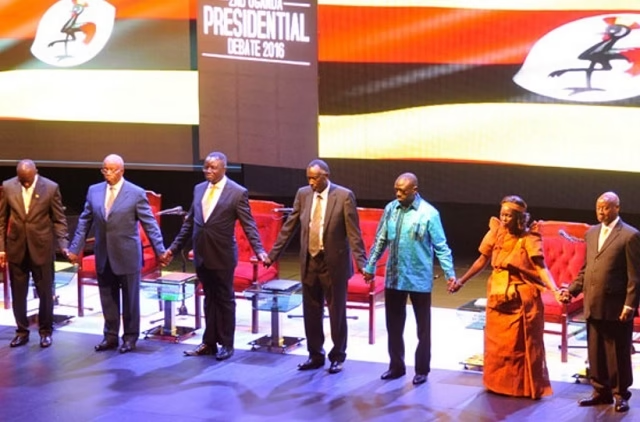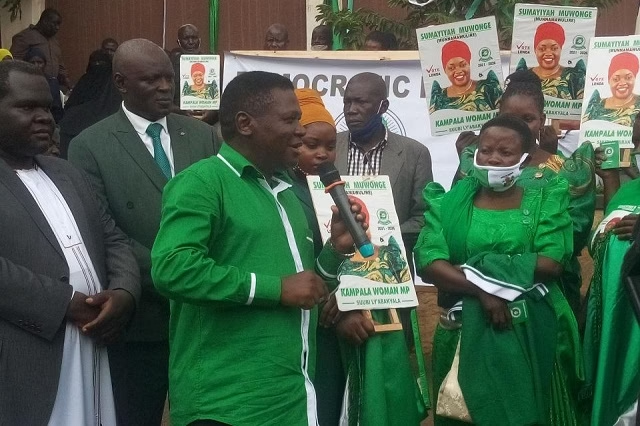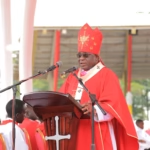The Democratic Party (DP), one of Uganda’s oldest political entities, has seen its fair share of internal strife and factionalism over the decades. Two critical moments in its post-independence history—1984 and 2010—serve as vivid reminders of the fragility of party unity, especially following contested leadership election
In 1984, a pivotal moment unfolded when the DP held elections for its President General. The party’s Vice President at the time, Tiberio Atwoma Okeny, lost to Dr. Paul Kawanga Ssemogerere, a long-standing figure in the party and a former presidential candidate.
Following his defeat, Okeny rejected the outcome, claiming the process was flawed and undemocratic. His grievances were not merely procedural—he accused Ssemogerere’s DP of being just as bad as Dr. Obote’s ruling Uganda People’s Congress (UPC), a serious indictment considering UPC’s authoritarian tendencies and regional bias. Okeny argued that the DP under Semo was being hijacked by one region, a veiled reference to Buganda’s perceived dominance in the party.
This disillusionment led to a significant rupture: Okeny, along with several DP stalwarts, broke away to form the Nationalist Liberal Party (NLP), a move that weakened DP’s national influence and fragmented the opposition.
Fast-forward to 2010, and history seemed to repeat itself. The DP once again held a leadership election, this time pitting long-time Kampala politician Haji Nasser Ntege Sebaggala against Norbert Mao, a charismatic and younger leader from northern Uganda.
Sebaggala lost to Mao and—echoing Okeny’s reaction—refused to accept the results. Rather than remain within the DP fold, he opted to create his own political vehicle, the Liberal Democratic Party (LDP). His departure signaled yet another fragmentation, rooted not just in personal ambition but also in broader concerns over regional representation, internal democracy, and party identity.
These two events—separated by more than two decades—underscore a pattern in DP politics: leadership contests often end in acrimony and schism. With the upcoming DP Delegates Conference in Mbarara, many are watching closely. Will the party learn from its turbulent past, or will history repeat itself once more?
If DP is to remain relevant in Uganda’s evolving political landscape, it must find a way to manage internal dissent constructively. Otherwise, the cycle of division and the birth of yet more breakaway parties may continue, further diluting its influence.
In Uganda’s multiparty democracy, unity and internal accountability may be DP’s most urgent challenges—and Mbarara could be the next turning point.
Indeed, like many political parties in Uganda and across Africa, the Democratic Party (DP) has not been immune to internal splits and factionalism. The cases of 1984 and 2010 are just two examples in a wider pattern of fragmentation that affects not only the DP but also other political entities.

Political separation has become something of a tradition in Uganda’s multiparty system. Ambitions, ideological differences, regional dynamics, and dissatisfaction with leadership frequently result in breakaway factions. DP’s history is deeply reflective of this:
- 1984: Tiberio Okeny, unhappy with Dr. Ssemogerere’s leadership and alleging regional bias, formed the Nationalist Liberal Party.
- 2010: After losing to Norbert Mao, Haji Nasser Sebaggala left and created the Liberal Democratic Party.
These are not isolated incidents. Similar breakaways have occurred in other major parties:
- Uganda People’s Congress (UPC) has experienced multiple splits, particularly following the fall of Milton Obote.
- Forum for Democratic Change (FDC) has recently seen internal divisions, with prominent figures like Mugisha Muntu breaking away to form the Alliance for National Transformation (ANT).
- Even the ruling National Resistance Movement (NRM) has lost high-profile members who later became presidential contenders or founded new political parties
- Leadership struggles: As seen in DP, when contested leadership elections do not satisfy all factions, losers often walk away.
- Regionalism and ethnic identity: Accusations of domination by one region or ethnic group often fuel grievances.
- Lack of internal democracy: When party processes are seen as unfair or manipulated, trust is eroded.
- Personal ambition: In many cases, leaders believe they stand a better chance politically by forming their own platforms.
While new parties may offer fresh ideas, the repeated breakaways have also weakened opposition cohesion in Uganda. Fragmentation dilutes the vote, making it harder to challenge entrenched powers like the NRM.
For the Democratic Party, the hope remains that the upcoming Delegates Conference in Mbarara will be a moment of reconciliation rather than another chapter of division. Whether history repeats or a new path is forged depends on the party’s willingness to embrace unity over ego, dialogue over discord.



